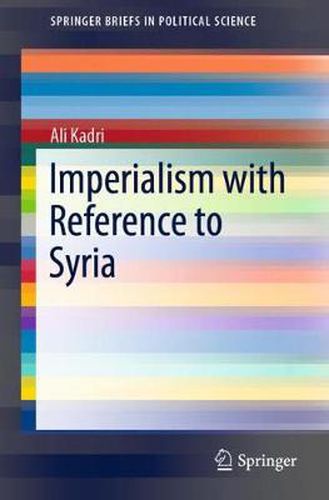Readings Newsletter
Become a Readings Member to make your shopping experience even easier.
Sign in or sign up for free!
You’re not far away from qualifying for FREE standard shipping within Australia
You’ve qualified for FREE standard shipping within Australia
The cart is loading…






This title is printed to order. This book may have been self-published. If so, we cannot guarantee the quality of the content. In the main most books will have gone through the editing process however some may not. We therefore suggest that you be aware of this before ordering this book. If in doubt check either the author or publisher’s details as we are unable to accept any returns unless they are faulty. Please contact us if you have any questions.
This extended essay investigates the meaning of imperialism in Syria, providing a valuable addition to the ongoing debate on the Syrian crisis through the lens of imperialism, modern warfare, and geopolitics. It offers a detailed analysis of how the Syrian war has been the product of imperialist ambitions. The author begins by situating the Syrian conflict in the regional historical continuum, positing that the modern imperialist war visited upon Syria is both a production domain intrinsic to capital, and an application of the law of value assuming a highly destructive form. Such processes, particularly the measure of war as a component of accumulation by waste and militarism, are peculiar to the imperialism of the United States, which the author argues is the sole imperialist power at play in Syria, and globally. With so many international forces vying with one another in this country, and some prominent Western scholars equally ascribing imperialism to the US, Russia and China, defining who the imperialist is can help to clear some of the fog in the war of positions, as a misplaced or ideologically motivated assessment can provide the wrong party with a justification for prolonging the war. This book will be of interest to academics in the social sciences and Middle Eastern studies, but will also appeal to all readers with an interest in patterns of global development, postcolonialism and neoliberal imperialism.
$9.00 standard shipping within Australia
FREE standard shipping within Australia for orders over $100.00
Express & International shipping calculated at checkout
This title is printed to order. This book may have been self-published. If so, we cannot guarantee the quality of the content. In the main most books will have gone through the editing process however some may not. We therefore suggest that you be aware of this before ordering this book. If in doubt check either the author or publisher’s details as we are unable to accept any returns unless they are faulty. Please contact us if you have any questions.
This extended essay investigates the meaning of imperialism in Syria, providing a valuable addition to the ongoing debate on the Syrian crisis through the lens of imperialism, modern warfare, and geopolitics. It offers a detailed analysis of how the Syrian war has been the product of imperialist ambitions. The author begins by situating the Syrian conflict in the regional historical continuum, positing that the modern imperialist war visited upon Syria is both a production domain intrinsic to capital, and an application of the law of value assuming a highly destructive form. Such processes, particularly the measure of war as a component of accumulation by waste and militarism, are peculiar to the imperialism of the United States, which the author argues is the sole imperialist power at play in Syria, and globally. With so many international forces vying with one another in this country, and some prominent Western scholars equally ascribing imperialism to the US, Russia and China, defining who the imperialist is can help to clear some of the fog in the war of positions, as a misplaced or ideologically motivated assessment can provide the wrong party with a justification for prolonging the war. This book will be of interest to academics in the social sciences and Middle Eastern studies, but will also appeal to all readers with an interest in patterns of global development, postcolonialism and neoliberal imperialism.